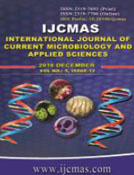


 National Academy of Agricultural Sciences (NAAS)
National Academy of Agricultural Sciences (NAAS)

|
PRINT ISSN : 2319-7692
Online ISSN : 2319-7706 Issues : 12 per year Publisher : Excellent Publishers Email : editorijcmas@gmail.com / submit@ijcmas.com Editor-in-chief: Dr.M.Prakash Index Copernicus ICV 2018: 95.39 NAAS RATING 2020: 5.38 |
Human immunodeficiency Virus (HIV) infection is a global pandemic, with cases reported virtually from every country. In HIV infected patients, a progressive decline in their immunological responses makes them extremely susceptible to a variety of common and opportunistic infections. Intestinal parasitic infection remains as an important cause of morbidity and mortality in developing countries. Presently, CD4 T cell count has been shown to be an excellent indicator which defines the degree of an immune suppression. Diarrhoea and intestinal parasitic infections are strongly associated with low CD4 T cell count. Therefore the present study was undertaken to determine the prevalence of enteric parasites affecting the HIV seropositive patients with and without diarrhoea. An attempt was also made to evaluate the association between CD4 T cell count and presence of enteric parasites. A total of 510 HIV seropositive patients were included in the study. Microscopic examination was done by direct saline and iodine mount. Smears were prepared to identify the coccidian parasites by using modified Ziehl-Neelsen stain. All the specimens were subjected to sedimentation and floatation technique for concentration of parasitic ova and cysts. Sheather’s sugar floatation technique was performed for detection of coccidian parasites. Estimation of CD4/CD8 count was done by automated flowcytometer analyzer (BD FACS). Out of 510 HIV seropositive patients, intestinal parasites were detected in 132 (25.88%) cases and most commonly observed intestinal parasite was Cryptosporidium parvum followed by Isospora belli and least commonly observed parasites were Hymenolepis nana and Taenia spp. The maximum incidence of diarrhoea was seen among patients with CD4 T cell count less than 200 cells / µl. Also, the detection rate of intestinal parasites was more in patients presented with diarrhoea having CD4 T cell count less than 200 cells / µl. The detection of intestinal parasites in HIV seropositive patients will help in proper management of these patients as drugs are available for the treatment of most of the infections. Hence, routine screening of the stool samples of HIV seropositive patients with and without diarrhoea should be done for prompt patient care, to prevent the fulminant form of the disease.
 |
 |
 |
 |
 |